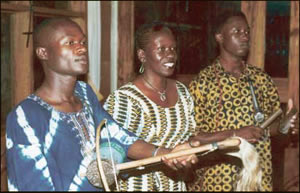Jan 09, 2026
Jan 09, 2026
The revelers wait eagerly as the woman adorned in traditional regalia - complete with a flywhisk (used to brush away flies; traditionally carried by leaders) - comes on stage at a popular nightspot in Kisumu, a city 350 km west of Nairobi. She sits on the floor, raises her knees and holds the nyatiti, a traditional Luo musical instrument, between her thighs. She is just about to strike the first note when the hall goes totally silent - and then the patrons leave one by one.
 The nyatiti is a 'male' instrument and the protestors argue that it is an insult to men and to Kenyan culture that Omwa Ombara - popularly known as OO - should even think of playing it in public. Ombara fights back her tears as she contemplates the hours of rehearsal she had put into preparing for the evening.
The nyatiti is a 'male' instrument and the protestors argue that it is an insult to men and to Kenyan culture that Omwa Ombara - popularly known as OO - should even think of playing it in public. Ombara fights back her tears as she contemplates the hours of rehearsal she had put into preparing for the evening.
Among her people, the instrument is passed from father to son and on to grandsons - never to a woman. It is an abomination for a woman to even touch the sacred instrument. When a local elder heard that Ombara was playing it, he suggested that she should be cleansed. (The ceremony did not actually take place, though.)
It is said in these parts that women who touch the nyatiti and orutu (another traditional harp) will never bear children. Yet the woman who taught Ombara to play had nine children. It is probably the way the instruments are held and the body movements that have influenced the decision to keep women away from the instruments. When one plays the nyatiti, it is placed between the thighs and the knees, which then knock in a suggestive way as finger and string strike. "A woman playing the instruments is thought of as a prostitute, making love to the nyatiti," says Ombara. "Men find this uncomfortable."
The orutu, held against the breast and marked by sexual overtones, is just as discomfiting for both women and men. Traditionally, a man playing the orutu used to be accompanied by a concubine or girlfriend, but never his wife. He would sing in praise of her sexual prowess. The man also praised himself and how good he was in bed. But over time, the orutu songs have changed. One can compose songs on social issues without being obscene. That's what Ombara does.
To avoid sending her audience bolting for the door, she does not play the orutu or nyatiti when she knows there are people from her community in the crowd, leaving the delicate parts to the men in her band.
Ombara says her paternal grandmother passed the knowledge to her when she was in lower primary school. "She secretly taught me how to play the orutu when I was about eight. I would scrub her back when she bathed while teaching me traditional songs, which I still know word for word. After we were through with the singing and playing, she hid the orutu in a millet granary and only fetched it when I next visited her."
As she pulled the string, her grandmother warned her it was an instrument for men and she should never tell anybody. Her family being staunch Anglicans, she kept the secret until two years ago.
It was tough for the family to come to terms with the fact that Ombara performs live in bars (popular places for upcoming Kenyan musicians to start out). Her mother sat through one of her shows just to confirm that her daughter had not actually gone mad. A day after, she took Ombara to church and explained to fellow worshippers that her daughter had a calling to preserve culture. Although her mother appreciates her talent, some of her siblings feel that her singing in the bars mars the reputation of the family.
But she has stuck to her resolve despite many hurdles. Some men want to touch her or dance with her when she is performing, but Ombara has learnt how to handle these situations professionally. She says, "It's frustrating when even band members imagine that I am 'loose' and can say what they want to me. I have to be firm with them, and express my displeasure. Within days, they toe the line and we work well together."
Even though she does not go so far as to praise women's sensuality, OO uses her songs to sensitize women on social empowerment and she remains true to the praise component of the orutu. "I can praise a handsome man who swept me off my feet or one who broke my heart. I sing of tall ones, good ones, clean ones. These were taboo sentiments a woman was never allowed to express."
The stage allows Ombara to say things she would not off stage. She uses figurative language while men describe things the way they are. The most challenging moment for her is when a person she knows walks into a show with a girlfriend and yet OO cannot tell the wife, even if she is her own sister. It is all in a day's work for a musician who has chosen to challenge the myths that keep women out of the entertainment industry.
30-Apr-2006
More by : Kwamboka Oyaro